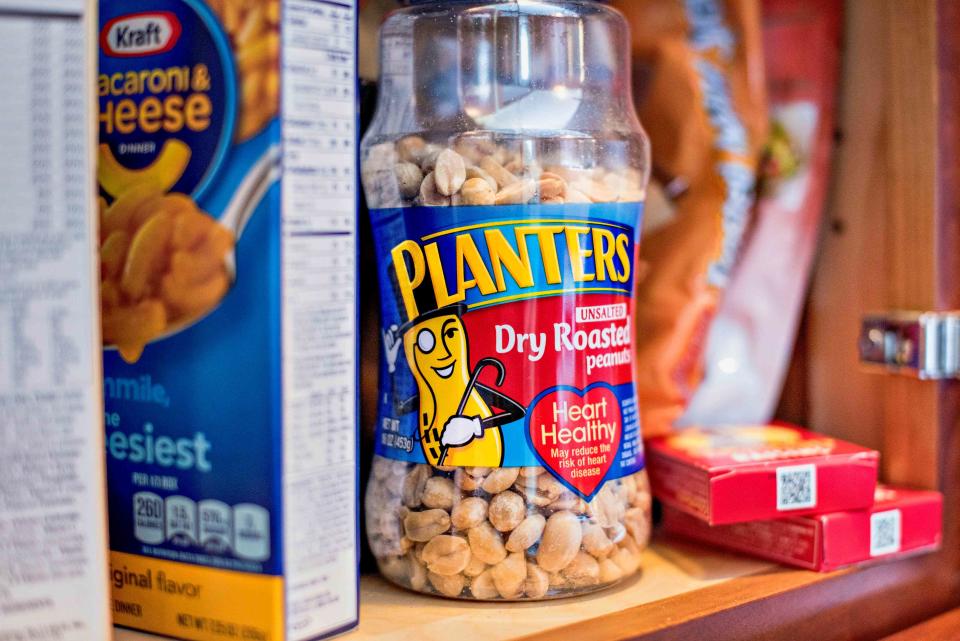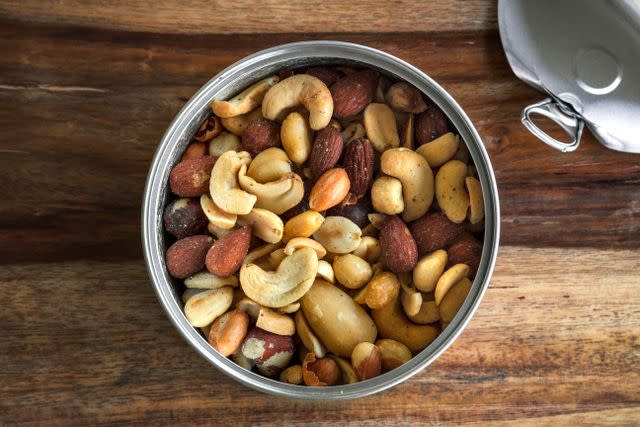The Only Way You Should Store Nuts, According to PLANTERS
Cracking the case on how to store nuts for longer storage and better flavor.

Simply Recipes / Getty Images
Nuts are one of my favorite snacks when feeling peckish. They’re a constant on my grocery shopping list, and when I get home from the store, I typically empty the plastic bag or jar of nuts into my favorite pantry storage containers and store them in the pantry.
Because I live in a house where nuts don’t stick around very long, I don’t worry about the storage life or proper storage, but that doesn’t mean I shouldn’t be! I’m cautious about where cooking oils, peanut butter, and spices are stored, but what about nuts?
It turns out that proper nut storage, whether in the pantry, refrigerator, or freezer, is crucial to maintaining their freshness. I turned to Amber Pylypiw, Group Manager at PLANTERS Brand Research and Development, and Breana Killeen, M.P.H., Registered Dietician to help me crack the case.
Navigating Short-Term and Long-Term Nut Storage
Pylypiw advices that “If you are planning to consume the nuts relatively quickly, the pantry is perfectly acceptable to store an opened canister, jar, or bag of nuts. If you think it’ll take you a while to consume the nuts, a refrigerator or freezer can help prolong the shelf life. Nuts are best consumed at room temperature, so if you do store them in the refrigerator or freezer, remember to take them out a little before consuming so they have a chance to warm up.“
I find this particularly useful since, in my house, nuts can either disappear in a day or linger forgotten behind a can of beans.
When Colder Storage Makes Sense
The logic behind colder storage options becomes more apparent with insights from Killeen, who emphasizes preserving quality.
“We always keep nuts in the freezer because they have a high (unsaturated fat) oil content that you don’t want to go rancid. Not because the composition of the nut will change, but more to maintain the texture and flavor. The freezer is the best place to keep them fresh and extend their shelf life. Especially because nuts are expensive!”
I store my nuts for baking in the freezer, in part to keep them fresh and in part to keep them away from hungry hands and ensure they’re there when I need them.
Killeen, adds a note of caution regarding flavor transfer if you opt for refrigeration: “Be mindful of what’s nearby; nuts can absorb odors due to their high-fat content. Be careful storing nuts next to foods that have strong aromas, like cantaloupe or a highly seasoned piece of meat… you might find your nuts tasting different over time. The freezer can also work if you plan to store your nuts over a long period of time. It might result in slightly more brittle nuts after thawing, but the difference is usually not noticeable to most people.”

Simply Recipes / Getty Images
Optimizing Nut Storage
No matter where you store your nuts, Killeen advocates for minimizing air exposure. "It’s also beneficial to remove as much air from the package as possible, so if you have a bag, go ahead and squeeze out the air or roll down the top, or better yet, store in an airtight, sealed container.”
And remember, not all nuts are created equally.
While these tips broadly apply to most nuts, she points out some nuances: “Certain nuts, such as walnuts and pecans, are most susceptible to going bad. And mild-flavored nuts, such as macadamia and cashews, are more susceptible to picking up their surrounding flavors. We have found peanuts are the hardiest “nut” and really can be open quite long before developing an off taste or smell because they have a strong flavor to begin with.”
Whether you’re munching through your nuts at a squirrel-like rate or storing for the long haul, understanding the why and how of nut storage from experts can help you store them confidently.
Read the original article on Simply Recipes.

